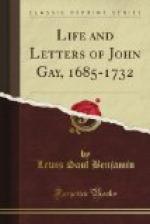It has been said that it was during this visit to Barnstaple that Gay began to write verses; and as most men who take to poetry began to dabble in ink in their youth, this statement may well be accepted. Only, so far no bibliographer has traced any of these early writings. Some poems, said to have been written by him in these days have been printed in the volume to which reference has already been made, “Gay’s Chair: Poems never before printed, written by John Gay.... With a Sketch of his Life from the MSS. of the Rev. Joseph Bailer, his nephew. Edited by Henry Lee ... 1820,” but the authenticity of these cannot definitely be accepted. A chair, said to have been the property of Gay at Barnstaple, was sold early in the nineteenth century to Henry Lee, who sent it to be repaired. “On taking out the drawer in front, which was somewhat broken,” so runs the story, “I found at the back part of the chair a concealed drawer, ingeniously fastened with a small wooden bolt;... it was full of manuscript papers, some of which appeared to have slipped over, as I found them stuck to the bottom or seat of the chair."[10] The poems in question are: “The Ladies’ Petition to the Honorable the House of Commons,” the longest and most ambitious of the pieces; “To Miss Jane Scott,” “Prediction,” “Comparisons,” “Absence,” “Fable,” “Congratulation to a Newly-married Pair,” “A Devonshire Hill,” “Letter to a Young Lady,” and “To My Chair.” Of this small collection, Mr. John Underhill, who includes it in his admirable edition of Gay’s poems in the “Muses’ Library,” writes: “The evidence in support of their authenticity is (1) the fact that they were found in a chair which was always spoken of by Gay’s ‘immediate descendants’ as ’having been the property of the poet, and which, as his favourite easy chair, he highly valued’; and (2) that ‘The Ladies’ Petition’ was printed nearly verbatim from a manuscript in the handwriting of the poet ... If really Gay’s, they [the verses] may, we think, a great many of them, be safely regarded as the production of his youth, written, perhaps, during the somewhat extended visit to Devonshire which preceded his introduction to the literary world of Pope. The least doubtful piece, ‘The Ladies’ Petition’ was probably ‘thrown off’ upon the occasion of his visit to Exeter in 1715.”
If the verses are genuine, they have such biographical interest as is afforded by an allusion to a youthful love-affair. There are lines “To Miss Jane Scott":—
The Welsh girl is pretty.
The English girl fair,
The Irish deem’d witty,
The French debonnaire;
Though all may invite me,
I’d value them not;
The charms that delight me
I find in a Scot.
It is presumedly to the same young lady he was referring in the verses written probably shortly after he returned to London after his visit to Devonshire:—
Absence.
Augustus, frowning, gave command.
And Ovid left his native land;
From Julia, as an exile sent.
He long with barb’rous Goths was pent.




